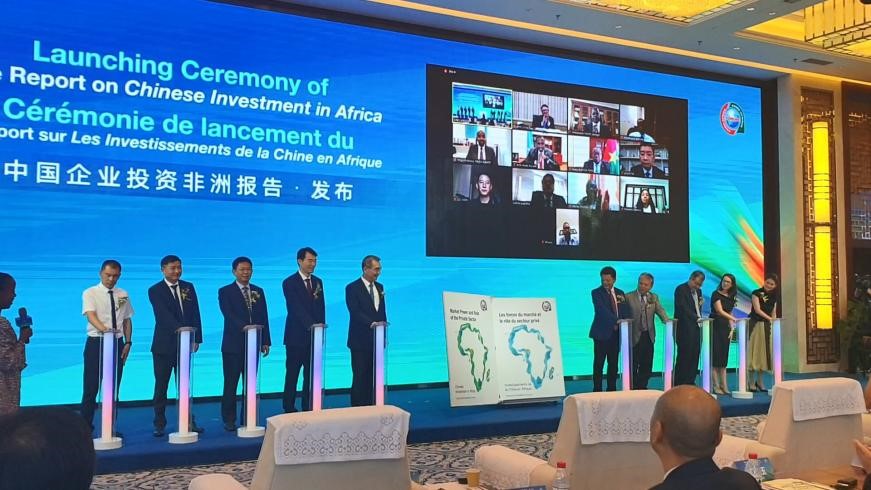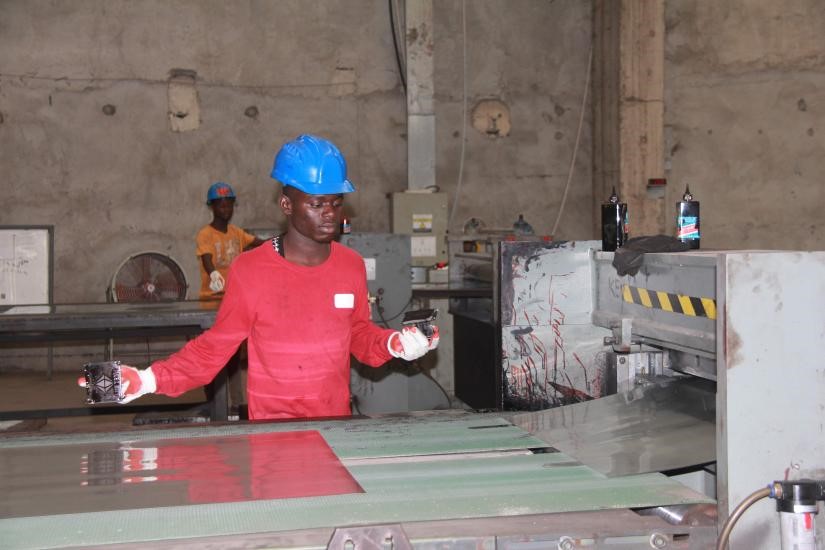Chinese enterprises a propeller for Africa's inclusive economic growth
Chinese enterprises have become one of the propellers for Africa's inclusive economic growth, said a report issued recently.
The Report on Chinese Investment in Africa was launched on Aug. 26 in Beijing. The launching ceremony was attended by political and business figures from both China and Africa, as well as international scholars. They gave a high evaluation on China-Africa economic and trade cooperation, saying Chinese enterprises' investment in Africa has made positive contributions to local industrialization, employment and livelihood.
The report, initiated by the China-Africa Business Council, was compiled by some 50 experts and researchers based on massive interviews with Chinese enterprises and entrepreneurs investing in Africa. Through 63 cases, it introduces Chinese enterprises' efforts to combat COVID-19 and reduce poverty on the continent, and summarizes the experiences of China-Africa investment cooperation.
The report says driven by the Forum on China-Africa Cooperation (FOCAC), Chinese enterprises are making "trivial but frequent" moves in investing in Africa, and private enterprises are playing an increasingly bigger role in the process.
Charles Onunaiju, director of the Center for China Studies of Nigeria, said at the launching ceremony that China has always supported the development and construction of African countries. Many African countries have joined the Belt and Road Initiative (BRI), which indicates Africa's confidence in its cooperation with China, the director remarked, adding that China's economic development and poverty reduction offer successful experiences for African countries.
China is one of the largest sources of investment for Africa. "Since the establishment of the FOCAC, the annual growth of China's direct investment in Africa has averaged over 25 percent. China's investment in Africa achieved positive growth against headwinds in the COVID-19 pandemic," said Wu Peng, Director-General of the Department of African Affairs of China's Foreign Ministry. Investment cooperation is a strong engine for the qualitative upgrading of the pragmatic cooperation between China and African nations, Wu added.
Justin Yifu Lin, honorary dean of the National School of Development at Peking University, said the investment of Chinese enterprises in Africa both advances China's economic development and offers capital, technology, and infrastructure support for African countries, helping them translate their advantageous resources into market competitiveness.
The joint construction of the BRI and the FOCAC is conducive to the development of both China and Africa, and enterprises are what put policies into practice, Lin said.
Secretary General of the African Continental Free Trade Area (AfCFTA) Wamkele Mene noted Chinese enterprises' investment, especially that in the infrastructure sector, has made huge contributions to the building of Africa's connectivity and the AfCFTA.
Successful cases of China-Africa cooperation are listed in the report, including the China-Egypt Suez Economic and Trade Cooperation Zone, the Standard Bank of South Africa, Kenya's Nairobi expressway, Ghana's Africa World Airlines, Transsion mobile phones and media group StarTimes.
Adama Compaore, ambassador of Burkina Faso to China said Burkina Faso welcomes and appreciates the investment from Chinese enterprises, and the investment has won trust in his country. He hopes more Chinese enterprises can invest in Burkina Faso, saying his country is willing to facilitate them.
China will maintain its position as the most important cooperation partner of Africa in the post-pandemic era, and more and more African enterprises are seeking cooperation with China, said Akinwumi Adesina, president of the African Development Bank. Chinese enterprises have brought technologies, management experience and capital to Africa, and accelerated economic development of the continent, he added.
Achieving inclusive economic development and sustainable development is listed as an important task in the Agenda 2063 of the African Union. The report believes that Africa will see accelerating urbanization and burgeoning manufacturing sector as it releases its huge demographic dividend, and China-Africa cooperation will enjoy new opportunities.
Executive Secretary Vera Songwe of the United Nations Economic Commission for Africa noted that China and Africa are seeing a robust momentum for cooperation. Chinese enterprises kept investing in Africa despite the impacts from COVID-19, and have created huge jobs for local communities, she said.
She said China-Africa cooperation has always set its eye on sustainable development, especially in the energy sector. She believes China's investment in Africa's renewable energy industry, in particular the hydro and solar power sectors, will help African nations reduce their dependence on fossil energy amid economic development.
Ethiopia's ambassador to China Teshome Toga Chanaka said Africa and China are a community with a shared future. He introduced that many major infrastructure projects have kicked off in Ethiopia and other African countries under the Belt and Road framework.
Africa-China cooperation gets increasingly important given the uncertain factors such as the ceaseless spread of COVID-19, Chanaka noted. The cooperation between the two sides is of vital significance for the stability of African economy and alleviating the impacts from COVID-19, and also plays a huge role in pandemic response and saving lives, he added.





